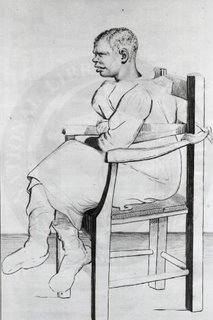Wednesday, November 22, 2006
In Dire Straits
 I've only written once or twice about David Horowitz and his campaign to intimidate ... opps ... counterbalance liberal professors in American academia with his so-called Academic Bill of Rights. There was reason enough to ignore him once he broke PZ Myers' heart by not including him in Horowitz' jeremiad, The Professors: The 101 Most Dangerous Academics in America. But Horowitz' little red caboose has hopped the tracks and, like most wrecks, it deserves a rubber of the neck.
I've only written once or twice about David Horowitz and his campaign to intimidate ... opps ... counterbalance liberal professors in American academia with his so-called Academic Bill of Rights. There was reason enough to ignore him once he broke PZ Myers' heart by not including him in Horowitz' jeremiad, The Professors: The 101 Most Dangerous Academics in America. But Horowitz' little red caboose has hopped the tracks and, like most wrecks, it deserves a rubber of the neck.The Pennsylvania House of Representatives created a special legislative committee to investigate the condition of academic freedom in the state and whether students need additional protection if they hold views that are "unpopular" with professors. Horowitz applied much swine lip gloss when news of the committee's draft report broke, in an attempt to paint a loss as a victory. But when the final report removed those fig leaves, as reported in an article by Scott Jaschik at Inside Higher Ed, Horowitz just lost it:
Horowitz said that he was furious about the “breathtaking audacity of this theft of the report by the Democrats and the unions,” and that a “cabal” of faculty leaders had convinced “weak-spined Republicans” (who controlled the committee) to go along with the “theft.”I suppose we will now get The Politicos: The 101 Most Dangerous Spines in America. But as Jaschik noted:
[B]ecause the final vote on the report was unanimous -- on a committee controlled by Republicans -- the committee made it more difficult for Horowitz to blame his problems on liberals.Not one to let going down in flames deter him for long, Horowitz rebounded:
He maintained, however, that despite the “travesty and the cover-up,” he was in fact pleased with what he accomplished in Pennsylvania.A perhaps more realistic assessment comes from Jaschik:
In the end, though, the panel on Tuesday stripped away what he had been citing as points of victory. The final report kept the language saying that it couldn’t find evidence of problems with students’ rights. On whether colleges need new policies, the report’s language changed, noting that some colleges have such policies and need only review them. On student evaluations of faculty members, the report shifted from urging colleges to change them to urging colleges to look at them and make their own decisions.Reality is a terrible thing to waste.



